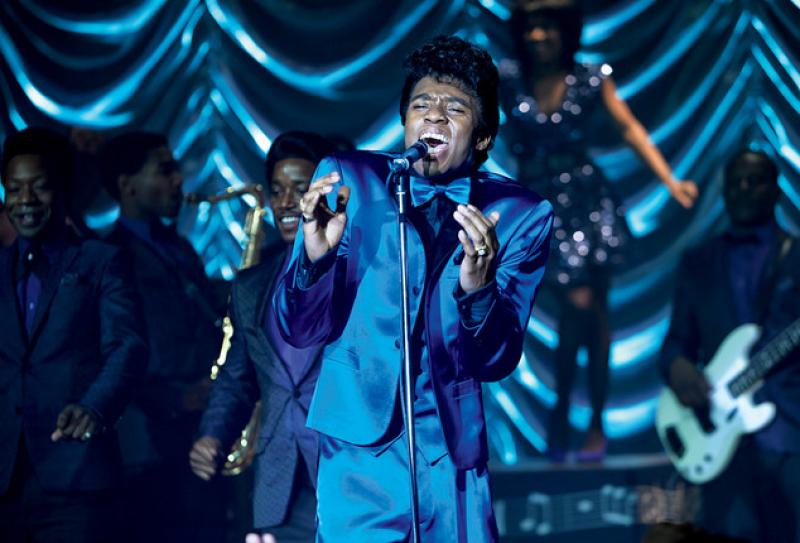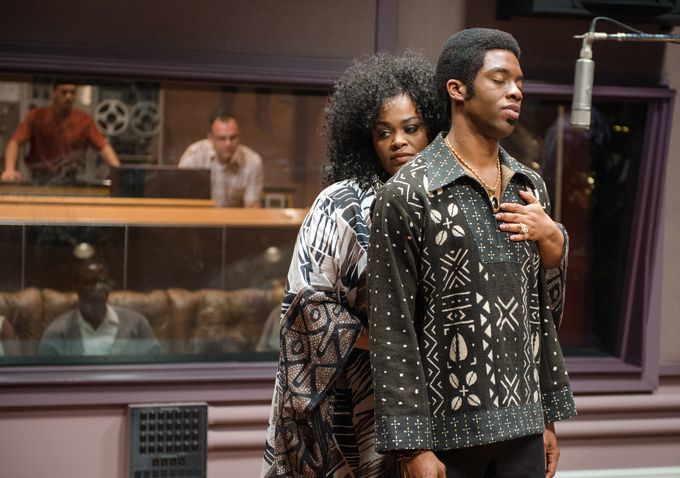Get On Up | reviews, news & interviews
Get On Up
Get On Up
Heartfelt tribute to James Brown that’s not quite on the money

James Brown has always been on my Desert Island Discs list, because, should despair threaten, his brand of propulsive funk could be guaranteed to make the castaway "Get Up Offa That Thing". But despite a compelling performance from Chadwick Boseman that vividly captures Brown’s blend of charisma, drive, self-absorption and business savvy, the film is short on Brown’s most defining characteristic – vitality.
All the hallmarks of a modern musical master’s biopic – a booming genre – are there: the troubled, hardscrabble beginnings that leave indelible scars and internal demons, problems with drug abuse/alcohol abuse/spousal abuse/jail time, and ultimate success and serenity, all the while creating a memorable musical legacy.
That the film got made at all is a tribute to the determination of its producer Mick Jagger
Trying to avoid the conventional chronological approach that served What’s Love Got To Do With It and Ray so well, Get On Up, like The Imitation Game, flashes back and forth between different timelines, using events in the past to underline our hero’s emotional response to events in the present. So we see glimpses of Brown’s impoverished childhood in the Georgia woods with an abusive father, the brothel where he found a sort of refuge after his mother abandoned him, and the ever-present climate of racial discrimination, all of which forged an absolute sense of self-reliance and a determination to succeed at all costs.
But the screenwriters, Jez Butterworth (best known for stage hit Jerusalem) and his brother John-Henry, have chosen to make the narrative so fragmented that consequences and emotional responses sometimes get lost. We see Brown firing his long-time band over a pay dispute and the next thing we see him playing a concert. Are any old band members there? Did anybody feel betrayed? None of this dramatic potential is exploited. Similarly, he hits Mrs Brown (the queenly Jill Scott, pictured below right, making the best of an underwritten role), and the next thing everything’s fine, with no trace of emotional fallout.
The emotional centre of the film and narrative continuity is provided by Brown’s ongoing relationship with friend and musical sidekick Bobby Byrd (an excellent Nelsan Ellis) but even this is muted. This oblique approach might work with an elusive shape-shifting artist like, say, Prince, or Bob Dylan (the subject of Todd Haynes’s wildly associative I’m Not There), but is an odd fit with Brown, whose appeal is nothing if not direct and visceral.
 Worse, a similar restraint applies to the musical numbers. We only get unsatisfying snippets of early career-defining hits like “Please Please Please” or “I Got You” and the one number that gets a full performance is the relatively MOR “It’s A Man’s Man’s Man’s World”. Director Tate Taylor handled the American South’s thorny race relations sensitively in The Help, but that story was told from a white perspective and one can’t help wondering if a director from another (OK, African-American) cultural background might have infused the proceedings with more grit and gusto.
Worse, a similar restraint applies to the musical numbers. We only get unsatisfying snippets of early career-defining hits like “Please Please Please” or “I Got You” and the one number that gets a full performance is the relatively MOR “It’s A Man’s Man’s Man’s World”. Director Tate Taylor handled the American South’s thorny race relations sensitively in The Help, but that story was told from a white perspective and one can’t help wondering if a director from another (OK, African-American) cultural background might have infused the proceedings with more grit and gusto.
That the film got made at all is a tribute to the determination of its producer and contender to inherit Brown’s mantle as “The Hardest Working Man in Showbusiness”, Mick Jagger (Jagger has also produced a documentary on Brown for HBO.) An early scene shows the Rolling Stones watching Brown from the wings of The T.A.M.I. Show, a fabulous filmed 1964 concert that has all the excitement missing here. What’s in The T.A.M.I. Show, but not in Get On Up, is Jagger going on after Brown and attempting to emulate the master in the manner of a baby bird attempting to fly. Get On Up is a similarly heartfelt tribute that’s not quite on the money.
Overleaf: watch the trailer for Get On Up
rating
Explore topics
Share this article
The future of Arts Journalism
You can stop theartsdesk.com closing!
We urgently need financing to survive. Our fundraising drive has thus far raised £49,000 but we need to reach £100,000 or we will be forced to close. Please contribute here: https://gofund.me/c3f6033d
And if you can forward this information to anyone who might assist, we’d be grateful.

Subscribe to theartsdesk.com
Thank you for continuing to read our work on theartsdesk.com. For unlimited access to every article in its entirety, including our archive of more than 15,000 pieces, we're asking for £5 per month or £40 per year. We feel it's a very good deal, and hope you do too.
To take a subscription now simply click here.
And if you're looking for that extra gift for a friend or family member, why not treat them to a theartsdesk.com gift subscription?
more Film
 Steve review - educator in crisis
Cillian Murphy excels as a troubled headmaster working with delinquent boys
Steve review - educator in crisis
Cillian Murphy excels as a troubled headmaster working with delinquent boys
 Can I get a Witness? review - time to die before you get old
Ann Marie Fleming directs Sandra Oh in dystopian fantasy that fails to ignite
Can I get a Witness? review - time to die before you get old
Ann Marie Fleming directs Sandra Oh in dystopian fantasy that fails to ignite
 Happyend review - the kids are never alright
In this futuristic blackboard jungle everything is a bit too manicured
Happyend review - the kids are never alright
In this futuristic blackboard jungle everything is a bit too manicured
 Robert Redford (1936-2025)
The star was more admired within the screen trade than by the critics
Robert Redford (1936-2025)
The star was more admired within the screen trade than by the critics
 Blu-ray: The Sons of Great Bear
DEFA's first 'Red Western': a revisionist take on colonial expansion
Blu-ray: The Sons of Great Bear
DEFA's first 'Red Western': a revisionist take on colonial expansion
 Spinal Tap II: The End Continues review - comedy rock band fails to revive past glories
Belated satirical sequel runs out of gas
Spinal Tap II: The End Continues review - comedy rock band fails to revive past glories
Belated satirical sequel runs out of gas
 Downton Abbey: The Grand Finale review - an attemptedly elegiac final chapter haunted by its past
Noel Coward is a welcome visitor to the insular world of the hit series
Downton Abbey: The Grand Finale review - an attemptedly elegiac final chapter haunted by its past
Noel Coward is a welcome visitor to the insular world of the hit series
 Islands review - sunshine noir serves an ace
Sam Riley is the holiday resort tennis pro in over his head
Islands review - sunshine noir serves an ace
Sam Riley is the holiday resort tennis pro in over his head
 theartsdesk Q&A: actor Sam Riley on playing a washed-up loner in the thriller 'Islands'
The actor discusses his love of self-destructive characters and the problem with fame
theartsdesk Q&A: actor Sam Riley on playing a washed-up loner in the thriller 'Islands'
The actor discusses his love of self-destructive characters and the problem with fame
 Honey Don’t! review - film noir in the bright sun
A Coen brother with a blood-simple gumshoe caper
Honey Don’t! review - film noir in the bright sun
A Coen brother with a blood-simple gumshoe caper
 The Courageous review - Ophélia Kolb excels as a single mother on the edge
Jasmin Gordon's directorial debut features strong performances but leaves too much unexplained
The Courageous review - Ophélia Kolb excels as a single mother on the edge
Jasmin Gordon's directorial debut features strong performances but leaves too much unexplained

Add comment